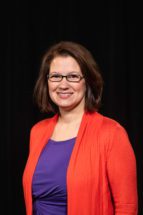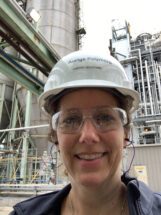Clemson University’s Data Science and Analytics Master’s Program ranked 5th in the Nation by Forbes
Fortune has ranked Clemson University’s online master’s degree program in data science and analytics the fifth best in the country.

Clemson’s program is a collaboration between the College of Science and the Wilbur O. and Ann Powers College of Business. It was rated 14th in Fortune’s inaugural ranking last year.
“There’s so much data produced every second, and there are not a lot of people who are trained to interpret that data,” said Ellen Breazel, a principal lecturer in the School of Mathematical and Statistical Sciences and co-director of the program. “Data science is a niche that is an overlap of statistics, math and computing. What makes our program unique is that we fold in some business content as well. Our goal is to create what we call translators — people who can analyze the data and interpret that for the managers and CEOs in terms that everyone can understand.”
Influence of data
In announcing the rankings, Fortune said the influence of data — and the technology developed to manage, analyze and utilize it – has grown immensely over the past decade. But companies still find it difficult to find trained professionals who can turn its potential into results, the magazine said.
The data science platform Anaconda said that in 2022, 90 percent of industry professionals were worried about what a talent shortage in the space could mean for the field.
Fortune’s ranking considered selectivity, success and demand. A program’s selectivity score considered the average undergraduate grade point average of incoming students and the program’s acceptance rate. The success score measured retention of students and graduation rates. Demand was measured by the program’s total enrollment and the number of applicants for the most recent year.

Russ Purvis, professor of management and the DSA program co-director, said the key to Clemson’s program is that it is an interdisciplinary degree.
“In addition to core coursework that includes data mining, data visualization and statistical analysis, the program also offers mandatory project-based learning opportunities. These projects focus on the real-world application of skills learned in the program and can be an opportunity for students to display the skills learned during the program to potential employers,” he said.
Clemson’s first DSA cohort began classes in summer 2020. Forty-seven students are enrolled in the program. Thirty-two students have already graduated.
Love of numbers
Bob Germaine, a December 2022 graduate of the program, had always liked numbers and statistics.
Germaine was working as a structural engineer in his home state of Arizona when he watched the luge competition in the 1984 Olympics. He decided he wanted to try it and attended a two-week camp in Lake Placid to learn how to slide. He was a member of the U.S. luge team from 1985 to 1990.

His daughter, Raychel, decided she wanted to compete in luge but was trying to overcome the misbelief that smaller stature athletes weren’t competitive in the sport.
“I did an analysis on different tracks and looked at body profiles, aerodynamics and friction to help her understand that it was a bit of a falsehood, that the statistics didn’t really hold up to that. It just kindled an enjoyment of digging into the numbers,” he said. His daughter competed for 10 years and finished as high as seventh in a World Cup competition.
Shortly after his daughter retired from the sport, Germaine’s wife saw an ad for the Clemson DSA program.
“It looked like a fun thing that I could do while I was working,” he said. “It was not easy, but it was fulfilling.”
Now, Germaine uses what he learned in his job as a project manager at Jacobs.
He also uses what he learned to help his son with a start-up business that involves physical fitness and athletic coaching.
Intrigued by the possibilities
Sherri Goodwin, another December 2022 graduate, is a data science engineer for Indorama Ventures, a chemical company that specializes in PET (polyethylene terephthalate) and fibers.
She decided to attend the DSA program after working on a project that utilized machine learning. A data scientist at the company, who is a Clemson graduate, showed her how the data could identify problems in the production process.

“I was intrigued by the process of machine learning and how it could take data investigation to the next level,” Goodwin said. “I started looking into how I could learn some of the methods and found out I could get a whole master’s degree. It was a dream come true.”
Goodwin said the program covered the various machine learning programs and why a data scientist would choose one over another. In addition, projects had students using “unclean” data, preparing them for real-world scenarios.
Goodwin is now putting what she learned through the DSA program to use in her job. She said the company does a lot of anomaly detection. She said that by using analytics, the company’s data scientists can see patterns and check out equipment before it fails.
“If we can catch something before failure, we can save considerable amounts of money,” she said.
Goodwin said data science and analytics can be used to predict physical properties such as color. Using this technology, it is possible to provide high quality products for the customer, she said.


